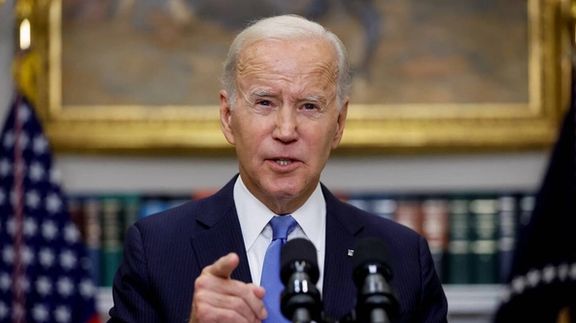Biden Admin Hesitant To Characterize Iran Protests

The US State Department Wednesday refused to characterize the demand of Iranian protesters as regime change after days of controversy and campaigns by activists.

The US State Department Wednesday refused to characterize the demand of Iranian protesters as regime change after days of controversy and campaigns by activists.
On October 23, US Special envoy for Iran Rob Malley sent out a tweet that became a source of controversy and triggered a strong backlash from Iranian-Americans and others. Malley wrote that protesters in Iran wanted “their government” to respect them and safeguard human rights, while clearly, they simply reject the Islamic Republic and want a secular, democratic government.
Iranian activists began an online campaign against Malley, even demanding his resignation.
Malley on Monday admitted that his choice of words was wrong, in an interview with Iran International, and the new line from the State Department became, “We cannot speak on behalf of Iranian protesters.”
Reporters on Wednesday asked the deputy spokesperson Vedant Patel again how the US would characterize the demands of the protesters, or what is the US government’s understanding about their demands.
Patel, again avoided an answer, saying that no one in the US government “should claim or can claim to speak for these protesters; only they can do that. And we, our role is to continue to take steps and take practical efforts to use the tools at our disposal to hold the regime accountable for what we are seeing happen across Iran.”
But pressed further, Patel did begin to characterize the aspiration of the Iranian protesters. “What we are seeing is the Iranian people demand basic human rights, rights of expression, as this started in the death of Mahsa Amini, and we’re seeing the Iranian people make their voices heard. But I don’t have any other specific assessment to offer.”
Saying that the Iranian people want “basic human rights” is not much different from what Rob Malley said a few days earlier.

Meanwhile, Iranian activist and women’s rights advocate Masih Alinejad has launched an online petition demanding Malley’s resignation that has collected nearly 100,000 signatures.
Tehran has been claiming from the start of the protests that the United States and “other enemies” are behind the unrest, because Iran has become “too powerful,” as President Ebrahim Raisi said this week, and they want to weaken it.
It is not clear if the Biden Administration is concerned that if it speaks about the real demand of the protesters, it might help Iran’s unsubstantiated claims, or it is just loath to uttering ‘regime change’, a term more popular with the former Trump administration.
Former President Donald Trump who pulled the United States out of the Obama-era nuclear deal with Iran imposed ‘maximum pressure’ sanctions on Tehran and his administration officials had no qualms about calling the clerical regime the main cause of trouble in the region.
Otherwise, the White House has been outspoken about the need to condemn the Islamic Republic for its violent crackdown on unarmed protesters. The administration has imposed sanctions on a series of Iranian officials and also adopted a tough position against Iranian drone deliveries to Russia that have terrorized Ukrainian civilians.